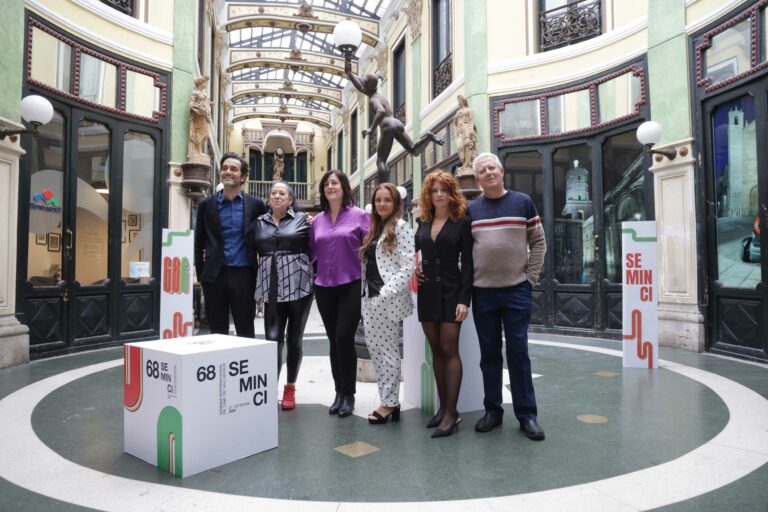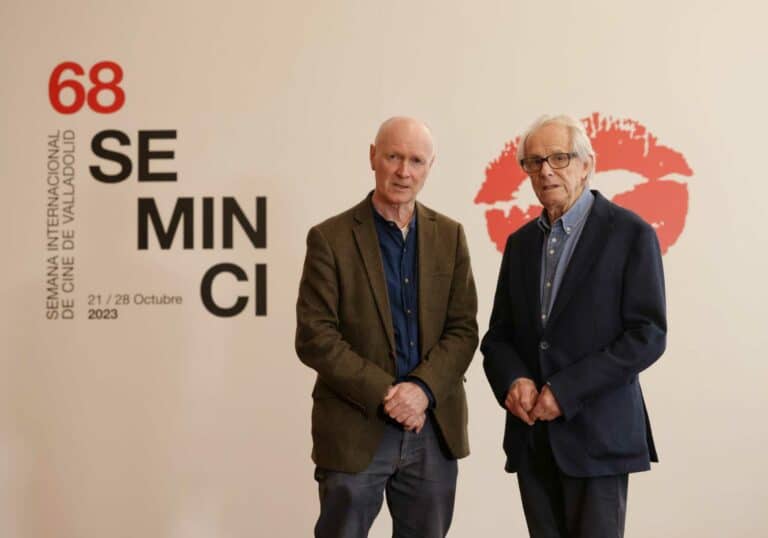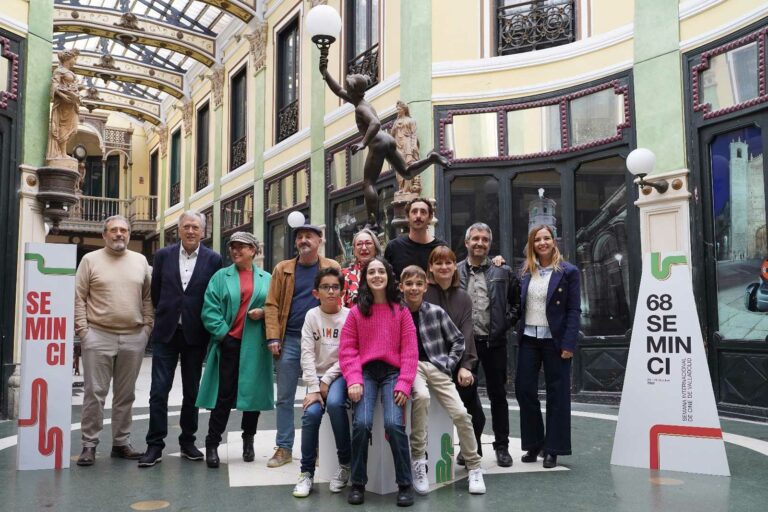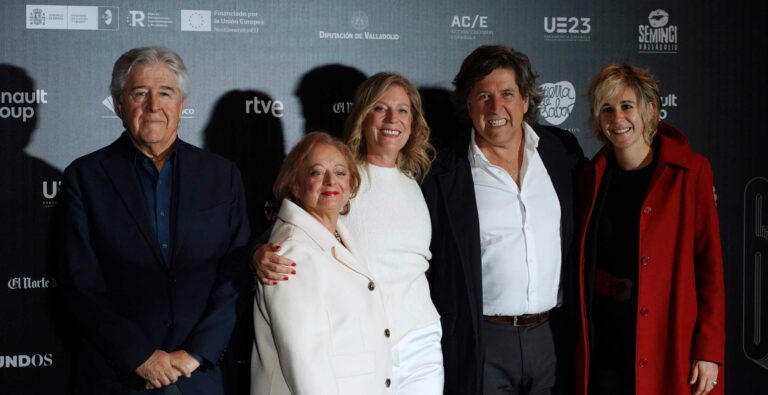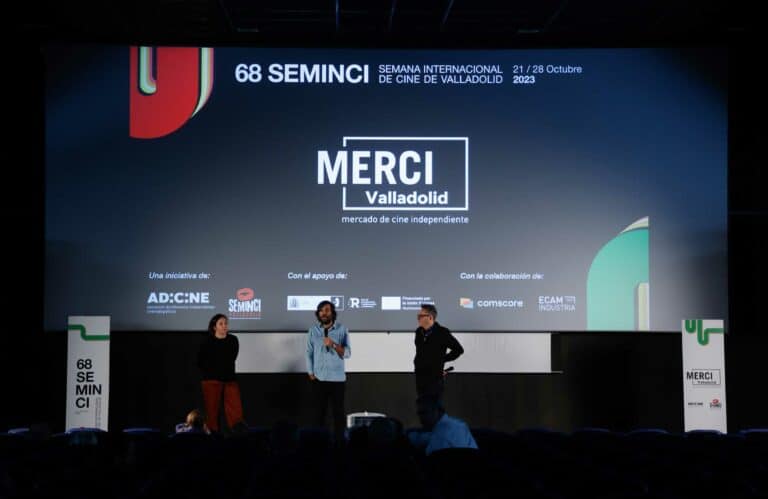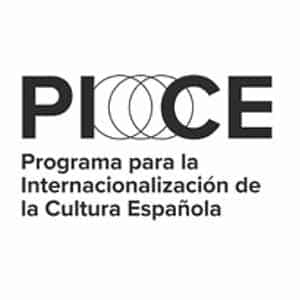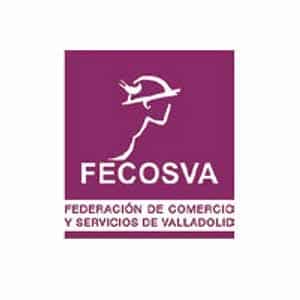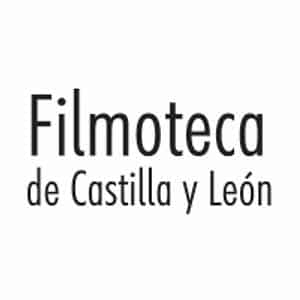
10/26/2019.- “Films have that special something that makes us dream,” said journalist Elena Sánchez at the beginning of the closing gala of the 64th Valladolid International Film Festival, Seminci, held on Saturday evening, in which she acted as a master of ceremonies alongside actress Eva Marciel. The Calderón Theatre was filled today with dreams and awards rewarding their coming true to bid farewell to the latest edition of the festival, which has screened 275 feature films and short films.
Before starting with the awards ceremony, Sánchez and Marciel said thank you once more on behalf of the festival to all the institutions and organisations that made this edition possible, and they brought back the song dedicated to them by Pablo Carbonell at the opening gala. The first awards to take to the stage were Seminci Joven (Mijn bijzonder rare week met Tess, by Steven Wouterlood) and Shorts from Castile and León (Muedra, by César Díaz Meléndez), handed over by actor Víctor Palmero. Following that, institutional director of the SGAE Foundation Silvia Pérez de Pablos, and member of the Dunia Ayaso award jury María Miró handed over the award created in memory of the Canary Islands-born director. The award recognises films that feature female characters in leading roles or that best portray women’s situation today. This edition’s winner was La hija de un ladrón by Belén Funes. “Thank you very much for this award, which has such a beautiful name. Thank you for considering that our film portrays a woman that avoids stereotypes and common places in some way.” Funes’s words were pronounced on her behalf by the film’s co-screenwriter Marçal Cebrian in Valladolid.
Cristina Castro, a member of the Green Spike jury, recalled that the winner of this 64th Seminci was Honeyland, by Ljubo Stefanov and Tamara Kotevska, and that the film The Price of Progress, by Victor Luengo, had been awarded a Special Mention. Gabriel Raposo, secretary of the festival’s Young Jury, also took to the stage alongside actress Laura Minguell to present the Official Section award given to The Farewell by Lulu Wang.
Eva Marciel, accompanied by Gonzalo Miró, said that this 64th Seminci celebrated the 40th anniversary of the only film banned in Spain during democracy, El crimen de Cuenca, by screening the documentary Regresa el Cepa by Víctor Matellano. El crimen de Cuenca was directed by Pilar Miró, after whom the Seminci award for Best New Director is named. Papicha, directed by Mouina Medoour, was the winner of this 64th edition. It was actor turned filmmaker Miki Molina that collected the Lark on the director’s behalf. Molina thanked the jury on behalf of the production company Bteam for “rewarding Mounia’s direction in this wonderful film that talks about how freedom takes years to be conquered but seconds to be lost.”
Next came the DOC. Spain section’s awards, which were handed over by Hernán Zin, who won the award in 2018 and was a member of the jury in this edition. Zin praised the “wonderful films” featured in this section. Daniel Méndez, producer of La Libertad es una palabra grande, by Guillermo Rocamora, won the award of the section devoted to Spanish documentaries. Andrés Sanz’s work in El Cuadro was awarded a Special Mention.
The director of Frisson d’amour Maxence Stamatiadis, who won the Time of History award for Best Short Film, showed up on the screen set up in the Calderón Theatre: “I feel extremely happy and flattered, but I can’t be with you today owing to another piece of good news — I’m going to become a father.” Also via video, Alexander Nanau expressed his gratitude for the second prize in the documentary section he was awarded for Colectiv, which revolves around the precariousness of the health system in the director’s home country, Romania: “I hope this award will help the film reach more people, because its scenes are of worldwide interest.” The first prize went to The Cave by Feras Fayyad.
Art and film critic Christos Skyllakos was in charge of handing over the award given annually at the festival by the International Federation of Film Critics, FIPRESCI. The winner was A vida invisível de Eurídice Gusmão by Karim Aïnouz: “The director conveys a balanced feminist view of contemporary social reality, and provides a good example of national and international cinema.”
For the fourth year in a row, the Fundación Triángulo and Seminci awarded the Rainbow Spike, which recognises films addressing sexual diversity and gender identity. This year, And Then We Danced by Levan Akin won one of Seminci’s most recent awards (it was presented for the first time at the 63rd edition.) Stephen Smith, from Avalon, the film’s distributor, said that “it is a story about the importance of freedom,” and added: “I hope that, going forward, awards like this will help people from all around the world be free to tell honest stories.” Member of the jury Yolanda Moreno announced that Nech je svetlo (Let There Be Light) by Marko Škop had been awarded a Special Mention.
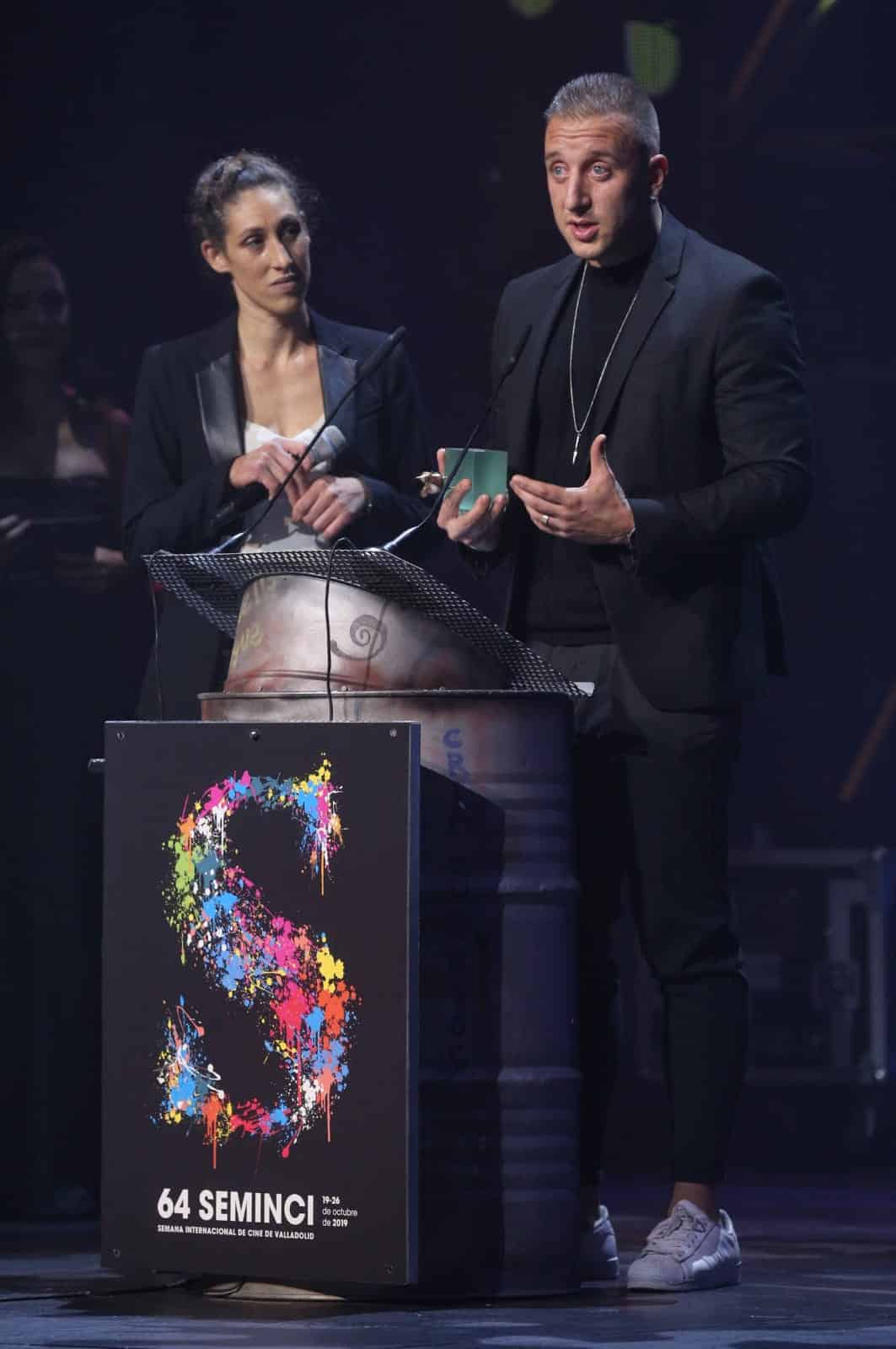
Adrián Lastra and Marina San José handed over the Meeting Point Young Jury award given to Le miracle du Saint Inconnu by Alaa Eddine Aijem, and the Best Foreign Short Film award for Hãy tỉnh thức và s vn sàng, by Pham Thien An, who said via video that it was “a great joy and an honour.” The director of Bik eneich: a fils Mehdi M. Barsaoui, which won the Meeting Point Audience award, handed over by actress Ruth Gabriel, also participated via video after that. Alongside Ruth Gabriel, Álvaro Arroba, a member of that section’s jury, handed over the ‘Night of Spanish Shorts’ award for Solsticio de verano to director Carlota González-Adrio, who, accompanied by the protagonist, Aida Folch, thanked the festival “for trusting and supporting young people.” Malene Choi, on behalf of the Meeting Point jury, handed over the section’s first prize to Basil Da Cunha, director of O fim do mundo: “I am grateful for this award because I see cinema as a way to give a voice to the most disadvantaged, to people who normally have no chance to express themselves.”
Seminci’s list of winners will get longer from this year onwards with a new award, the ‘José Salcedo’ award for Best Film Editing. This award was created in memory of film editor José Salcedo, who used to edit Almodóvar’ films, among other directors’. The award was handed over by another editor, Teresa Font, who highlighted the importance of their “work, which is essential but sometimes overlooked,” and said that this award is “a final recognition for Pepe, working with whom, according to Pedro Olea, was like having a picnic in the sun.” Ana Amigo collected the award on behalf of the winners, Marie-Hélène Dozo and Tristan Meunier, for Le jeune Ahmed, by Jean-Pierre and Luc Dardenne.
Next came the two acting awards, presented by actors Óscar Jaenada and Nerea Barros. Stephan Smith took to the stage again to collect Levan Gelbakhiani’s Best Actor award for And Then We Danced. Actresses Julia Stockler and Carol Duarte, protagonists of A life invisível by Eurídice Gusmão, expressed their gratitude for the award they both won for their performances, and said that the film will have its theatrical release on November 22.
Writer Rosa Montero, a member of the International Jury, announced the winners of the ‘Miguel Delibes’ award for Best Script, the Dardenne brothers, and read a few words written by them: “Writing the script was a peculiar adventure in which we found ourselves in the same situation as the protagonist’s mother, because the character totally got away from us, forcing us to escape the bizarre.”
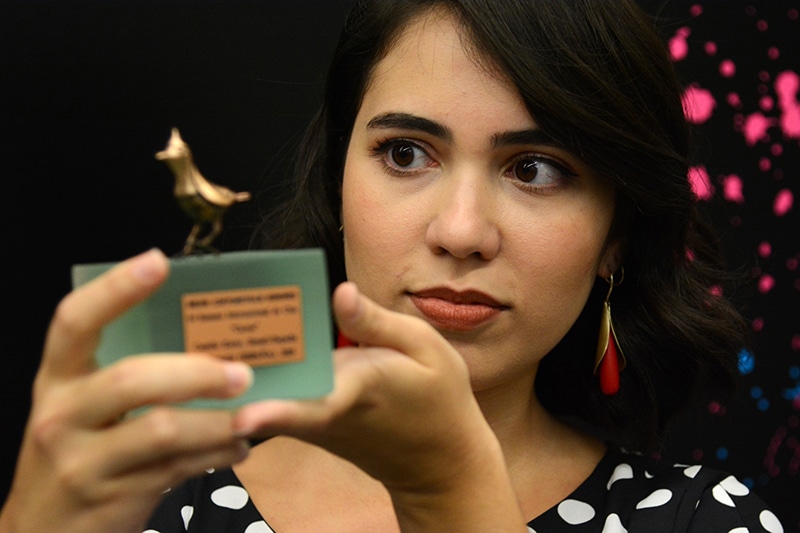
The protagonist of the closing film, Anna-Maija Tuokko, handed over the Lark for Best European Short Film awarded to Carne by Camila Kater, who was accompanied by film’s producer Chelo Loureiro. “I thank the festival for the award, and I thank all the brave women who tell their stories in this film. This award is dedicated to the filmmakers whom the government of my home country, Brazil, wants to silence, but who will continue making the films they want to make,” said Kater.
Thierry Forte, on behalf of the International Jury, advocated the short film format before presenting the films awarded with this edition’s Silver Spike (Movements, by Dahee Jeong) and Golden Spike (The Physics of Sorrow, by Theodore Ushev.) Both directors showed up via video at the Calderón Theatre, and said that the festival is “a wonderful audience.”
Another member of the International Jury, Dilip Mehta, highlighted the “impressive” photography of Öndög, by Wang Qua’an, the film that won an award in this category thanks to Aymerick Pilarski’s work. For her part, actress Natalia Roig collected the Official Section Audience award for Papicha on behalf of the film’s director Mouina Meddour. The actress passed on a message from the production company, Bteam: “Thank you, because — what would be of films without their audience?”
Keti Machavariani, also a member of the International Jury, presented the Silver Spike, awarded to A vida invisível de Eurídice Gusmão by Karim Aïnouz, while actress Kira Miró and general manager of the Regulatory Council of Ribera del Duero Miguel Sanz introduced the video in which Rúnar Rúnarsson expressed his gratitude for the ‘Ribera del Duero’ Best Director award.
The last award to be given was the coveted Golden Spike, which in this 64th Seminci was awarded to Öndöng by Wang Qua’an. Enrique González Kühn collected the Spike on the director’s behalf. The closing gala ended with the screening of Finnish director Mika Kaurismäki’s latest film, Master Cheng. The protagonist, who took to the stage once more, described the film as “a story about love, food, and nature.”
Before the screening, the presenters of the closing gala bid farewell by thanking the audience of the festival “for filling the screening rooms, because films must be enjoyed on the big screen, that is something we must advocate,” and shouted “Long live Seminci!“



